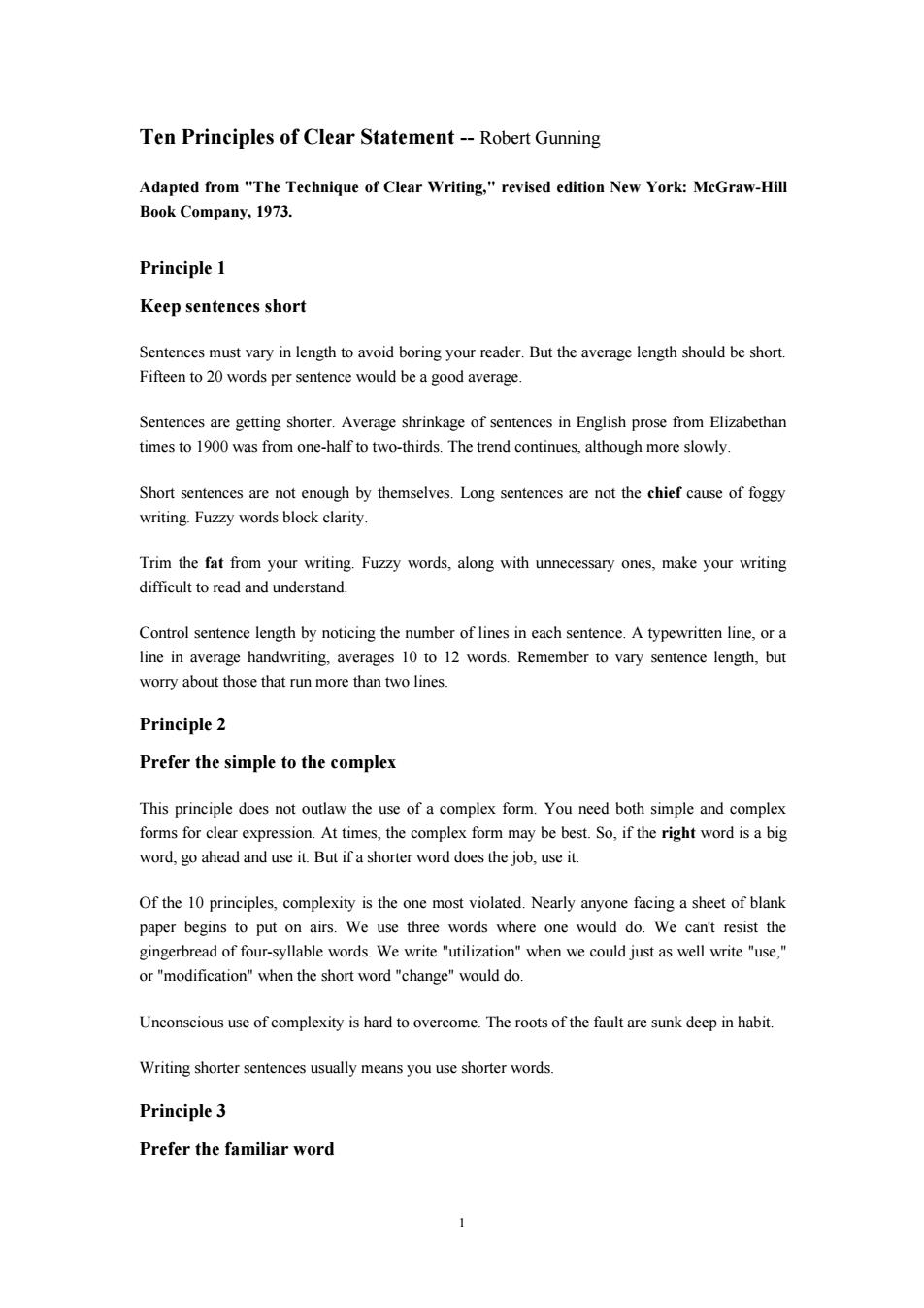正在加载图片...

Ten Principles of Clear Statement--Robert Gunning Adapted from "The Technique of Clear Writing,"revised edition New York:McGraw-Hill Book Company,1973. Principle 1 Keep sentences short Sentences must vary in length to avoid boring your reader.But the average length should be short. Fifteen to 20 words per sentence would be a good average. Sentences are getting shorter.Average shrinkage of sentences in English prose from Elizabethan times to 1900 was from one-half to two-thirds.The trend continues,although more slowly. Short sentences are not enough by themselves.Long sentences are not the chief cause of foggy writing.Fuzzy words block clarity. Trim the fat from your writing.Fuzzy words,along with unnecessary ones,make your writing difficult to read and understand. Control sentence length by noticing the number of lines in each sentence.A typewritten line,or a line in average handwriting,averages 10 to 12 words.Remember to vary sentence length,but worry about those that run more than two lines. Principle 2 Prefer the simple to the complex This principle does not outlaw the use of a complex form.You need both simple and complex forms for clear expression.At times,the complex form may be best.So,if the right word is a big word,go ahead and use it.But if a shorter word does the job,use it. Of the 10 principles,complexity is the one most violated.Nearly anyone facing a sheet of blank paper begins to put on airs.We use three words where one would do.We can't resist the gingerbread of four-syllable words.We write "utilization"when we could just as well write "use," or "modification"when the short word "change"would do. Unconscious use of complexity is hard to overcome.The roots of the fault are sunk deep in habit. Writing shorter sentences usually means you use shorter words. Principle 3 Prefer the familiar word1 Ten Principles of Clear Statement -- Robert Gunning Adapted from "The Technique of Clear Writing," revised edition New York: McGraw-Hill Book Company, 1973. Principle 1 Keep sentences short Sentences must vary in length to avoid boring your reader. But the average length should be short. Fifteen to 20 words per sentence would be a good average. Sentences are getting shorter. Average shrinkage of sentences in English prose from Elizabethan times to 1900 was from one-half to two-thirds. The trend continues, although more slowly. Short sentences are not enough by themselves. Long sentences are not the chief cause of foggy writing. Fuzzy words block clarity. Trim the fat from your writing. Fuzzy words, along with unnecessary ones, make your writing difficult to read and understand. Control sentence length by noticing the number of lines in each sentence. A typewritten line, or a line in average handwriting, averages 10 to 12 words. Remember to vary sentence length, but worry about those that run more than two lines. Principle 2 Prefer the simple to the complex This principle does not outlaw the use of a complex form. You need both simple and complex forms for clear expression. At times, the complex form may be best. So, if the right word is a big word, go ahead and use it. But if a shorter word does the job, use it. Of the 10 principles, complexity is the one most violated. Nearly anyone facing a sheet of blank paper begins to put on airs. We use three words where one would do. We can't resist the gingerbread of four-syllable words. We write "utilization" when we could just as well write "use," or "modification" when the short word "change" would do. Unconscious use of complexity is hard to overcome. The roots of the fault are sunk deep in habit. Writing shorter sentences usually means you use shorter words. Principle 3 Prefer the familiar word